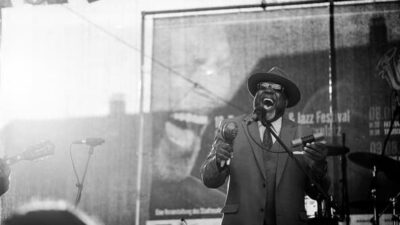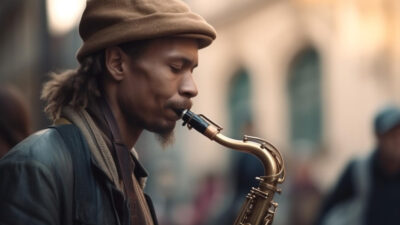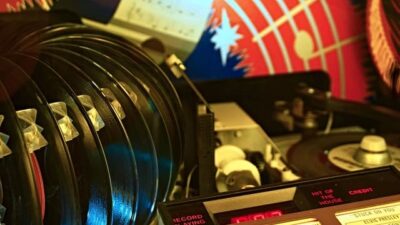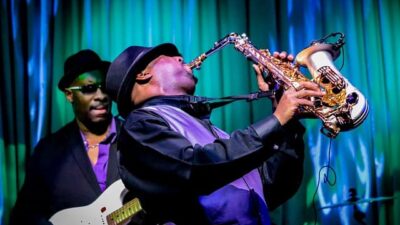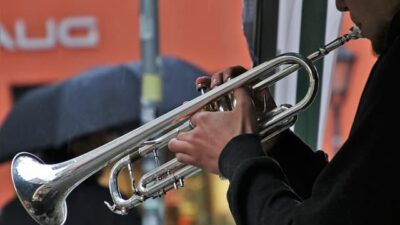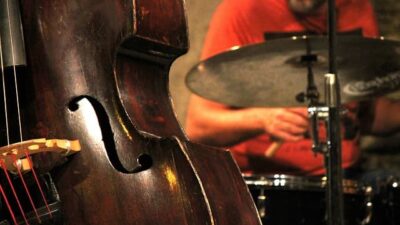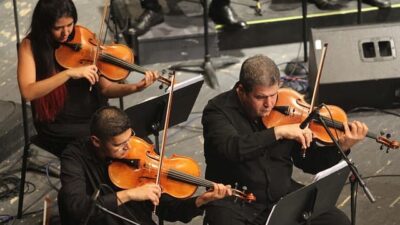The great jazz artists, composers, and vocalists who have changed the world of music. Ris_Che takes a look at the achievements of the masters of improvisation and how they have influenced the history of the genre.
As one of America’s most revered forms of music, jazz has laid the foundation for an entire industry, revealing to the world the names of many brilliant composers, instrumentalists and vocalists, and spawning a wide range of genres. The 15 most influential jazz musicians are responsible for a global phenomenon that has occurred over the past century in the history of the genre.
Jazz developed in the later years of the 19th century and early 20th as a movement that combined classical European and American sounds with African folk motifs. Songs were sung with syncopated rhythm, sparking the development of Dixieland and later the formation of large orchestras to perform it. The music made great strides from the days of ragtime to modern jazz.
The influence of West African musical culture in what music is written and how it is performed is evident. Polyrhythm, improvisation, and syncopation are what characterize jazz. Over the past century, this style has changed under the influence of the genre’s contemporaries, who have contributed their own ideas about the essence of improvisation. New directions began to appear – bebop, fusion, Latin jazz, free jazz, funk, acid jazz, hard bop, smooth jazz, cool jazz, and so on.
Art Tatum
Art Tatum is one of the best jazz pianists and virtuoso who was practically blind. He is known as one of the greatest pianists of all time who changed the role of the piano in the jazz ensemble. Tatum turned to the Stride style to create his own unique way of playing, adding swing and fantastic improvisation to the rhythm. His approach to jazz music fundamentally changed the meaning of the piano in jazz as a musical instrument from its previous characteristics.
Tatum experimented with melody harmonies, influencing and expanding the chord structure. All this characterized the bebop style, which would be known to become popular ten years later when the first recordings of the genre appeared. Critics also noted his impeccable playing technique – Art Tatum was able to play the most difficult passages with such ease and speed that his fingers seemed to barely touch the black and white keys.
Thelonious Monk
Some of the most complex and diverse sounds can be found in the repertoire of the pianist and composer Thelonious Monk, one of the most important representatives of the bebop era and its subsequent development. His very personality as an eccentric musician helped popularize jazz. Always dressed in a suit, hat and sunglasses, Monk openly expressed his free attitude toward improvisational music. He did not accept strict rules and formed his own approach to composing. Some of his most brilliant and well-known works were Epistrophy, Blue Monk, Straight, No Chaser, I Mean You and Well, You Needn’t.
Monk’s playing style was built on an innovative approach to improvisation. His works are characterized by percussive passages and abrupt pauses. Quite often during his performances he jumped up from behind the piano and danced while the other members of the band continued to play the tune. Thelonious Monk remains one of the most influential jazz musicians in the history of the genre.
Charles Mingus
Acclaimed double bass virtuoso, composer and bandleader Charles Mingus was one of the most extraordinary musicians on the jazz scene. He developed a new musical style by combining gospel, hard bop, free jazz and classical music. Contemporaries called Mingus “Duke Ellington’s heir apparent” for his fantastic ability to write works for small jazz ensembles. His compositions showcased the skills of everyone in the ensemble, each of whom was also not just talented, but characterized by a unique playing style.
Mingus carefully selected the musicians that made up his band. The legendary double bassist had a temper and once even punched trombonist Jimmy Nepper in the face, knocking out his tooth. Mingus suffered from a depressive disorder, but wasn’t willing to let it affect his creative work in any way. Despite this ailment, Charles Mingus is one of the most influential figures in jazz history.
Art Blakey
Art Blakey was a famous American drummer and bandleader who created a furor in style and technique on the drum kit. He combined swing, blues, funk and hard bop, a style heard in every modern jazz composition today. Along with Max Roach and Kenny Clark, he invented a new way to play bebop on drums. For more than 30 years his band, The Jazz Messengers, has given the big-time jazz scene a host of jazz artists: Benny Golson, Wayne Shorter, Clifford Brown, Curtis Fuller, Horace Silver, Freddie Hubbard, Keith Jarrett, Wynton Marsalis .
“The Jazz Messengers didn’t just make phenomenal music-they were a kind of “musical proving ground” for young talented musicians, like Miles Davis’ band. Art Blakey’s style changed the sound of jazz itself, becoming a new musical milestone.
Dizzy Gillespie
Jazz trumpeter, singer, composer, and bandleader Dizzy Gillespie was a notable figure in the days of bebop and modern jazz. His trumpet playing influenced the style of Miles Davis, Clifford Brown, and Fats Navarro. After his time in Cuba, Gillespie was one of those musicians who actively promoted Afro-Cuban jazz upon his return to the United States. In addition to his inimitable performance on the characteristically curved trumpet, Gillespie could be recognized by his horn-rimmed glasses and impossibly large cheeks when he played.
The great jazz improviser Dizzy Gillespie, as well as Art Tatum, innovated in harmonies. The compositions Salt Peanuts and Goovin’ High were rhythmically quite different from previous works. Staying true to bebop throughout his career, Gillespie is remembered as one of the most influential jazz trumpeters.
Max Roach
In the top ten of the 15 most influential jazz musicians in the history of the genre is Max Roach, one of the best jazz drummers and one of the pioneers of bebop. He, like few others, influenced the modern manner of drumming. Roach was a civil rights activist and with Oscar Brown Jr. and Coleman Hawkins even recorded the album We Insist! – Freedom Now, commemorating the 100th anniversary of the signing of the Emancipation Proclamation. Max Roach is the exponent of a flawless playing style, capable of playing a sustained solo throughout the concert. Absolutely any audience was thrilled by his unparalleled skill.
Billie Holiday
Lady Day is a favorite of millions. Billie Holiday only wrote a few songs, but when she sang, she wrapped her voice from the first notes. Her performance is deep, personal and even intimate. Her style and intonation are inspired by the sound of musical instruments she has heard. Like virtually all of the musicians described above, this famous jazz singer has become the creator of a new, but now vocal style based on long musical phrases and the tempo of their singing.
The famous Strange Fruit is the best not only in Billie Holiday’s career, but in the history of jazz because of the singer’s heartfelt performance. She was posthumously honored with prestigious awards and inducted into the Grammy Award Hall of Fame.
John Coltrane
John Coltrane’s name is synonymous with virtuoso playing technique, superb songwriting talent and a passion for exploring new facets of the genre. The saxophonist made enormous strides on the cusp of hard bop’s beginnings, becoming one of the most influential musicians in the genre’s history. Coltrane’s music had a sharp sound, and he played with high intensity and dedication. He was able to play solo as well as improvise in an ensemble, creating solo parts of unimaginable length. Playing tenor and soprano saxophone, Coltrane was also able to create smooth-jazz melodic compositions.
John Coltrane is the author of a kind of “reboot of bebop” by incorporating modal harmonies. While remaining a major figure in the avant-garde, he was a very prolific composer and never stopped releasing CDs, recording some 50 albums as a bandleader over the course of his career.
Count Basie
Revolutionary pianist, organist, composer and bandleader Count Basie led one of the most successful bands in jazz history. Over 50 years, the Count Basie Orchestra, including incredibly popular musicians such as Lester Young, Sweets Edison, Buck Clayton and Joe Williams, has earned a reputation as one of America’s most sought-after big bands. Winner of nine Grammy Awards, Count Basie has instilled a love of the orchestral sound in generations of listeners.
Basie has written many compositions that have become jazz standards, such as April in Paris and One O’Clock Jump. He was described by his colleagues as tactful, humble, and full of enthusiasm. Without Count Basie’s big band in jazz history, the era of great jazz orchestras would have sounded different, and surely would not have been as influential as it was with this outstanding bandleader.
Coleman Hawkins
The tenor saxophone is a symbol of bebop and jazz music in general. And thankful for that we can be Coleman Hawkins. The innovations Hawkins brought were vital to the development of bebop in the mid-forties. His contributions to the instrument’s popularity may have defined the future careers of John Coltrane, Sonny Rollins, and Dexter Gordon.
The composition Body and Soul (1939) became the benchmark for tenor saxophone playing for many saxophonists. Other instrumentalists such as pianist Thelonious Monk, trumpeter Miles Davis and drummer Max Roach were also influenced by Hawkins. His capacity for unorthodox improvisation led to the discovery of new jazz sides of the genre that had not been touched by his contemporaries. This explains, in part, why the tenor saxophone has become an integral part of the modern jazz ensemble.
Benny Goodman
The top five of the 15 most influential jazz musicians in the history of the genre is Benny Goodman. The famous King of Swing led some of the most popular orchestras of the early 20th century. His concert at Carnegie Hall in 1938 is recognized as one of the most important live concerts in American music history. This show demonstrates the dawn of the jazz era, the recognition of the genre as an art form in its own right.
Although Benny Goodman was a soloist in a major swing orchestra, he was also involved in the development of bebop. His orchestra was one of the first to bring together musicians of different races. Goodman was a fierce opponent of the Jim Crow Act. He even turned down a tour of southern states in support of racial equality. Benny Goodman was an activist and reformer not only in jazz music, but also in popular music.
Miles Davis
One of the central jazz figures of the 20th century, Miles Davis was at the origins of many musical developments and oversaw their development. He is credited with pioneering the genres of bebop, hard bop, cool jazz, free jazz, fusion, funk and techno music. In his constant search for a new musical style he always achieved success and was surrounded by brilliant musicians including John Coltrane, Cannoball Edderly, Keith Jarrett, Herbie Hancock, J.J. Johnson, Bill Evans, Wayne Shorter and Chick Corea. During his lifetime, Davis was awarded eight Grammy Awards and inducted into the Rock and Roll Hall of Fame. Miles Davis was one of the most active and influential jazz musicians of the last century.
Charlie Parker
When you think of jazz, the name Charlie Parker comes to mind. Also known as Bird, Parker was a jazz alto saxophone pioneer, bebop musician and composer. His quick playing, clear sound, and talent as an improviser had a significant impact on musicians of the time and our contemporaries. As a composer, he changed the standard of jazz music writing. Charlie Parker became the musician who cultivated the idea that jazzmen were artists and intellectuals, not just showmen. Many artists tried to copy Parker’s style. His famous playing techniques can also be seen in the style of many of today’s aspiring musicians, who take as their basis the alto-sacophonist’s moniker Bird.
Duke Ellington
Duke Ellington was a tremendous pianist, composer, and one of the most prominent orchestra leaders. Although he is known as a pioneer of jazz, he excelled in other genres as well, including gospel, blues, classical and popular music. It is Ellington who is credited with elevating jazz to a distinct art form. With countless awards and prizes to his name, the first great composer of jazz never stopped improving. He was an inspiration to successive generations of musicians, including Sonny Stitt, Tony Bennett, Oscar Peterson, Earl Hines, and Joe Pass, who later became one of the best jazz guitarists in the world. Duke Ellington remains an acknowledged genius of the jazz piano – instrumentalist and composer.
Louis Armstrong
Undoubtedly the most influential jazz musician in the history of the genre, Louis Armstrong, known as Satchmo, is a trumpeter from New Orleans and one of the best jazz singers in the history of the genre. He is known as the creator of jazz, playing a key role in its development. His remarkable ability as a performer elevated the trumpet to a solo jazz instrument. He was the first musician to sing in and popularize the “skat” style. His low, “rumbling” timbre of voice was unrecognizable.
Armstrong’s commitment to his own ideals influenced the work of Frank Sinatra and Bing Crosby, Miles Davis and Dizzy Gillespie. Louis Armstrong influenced not only jazz, but the entire musical culture, giving the world a new genre, a unique way of singing and a style of playing the trumpet.



